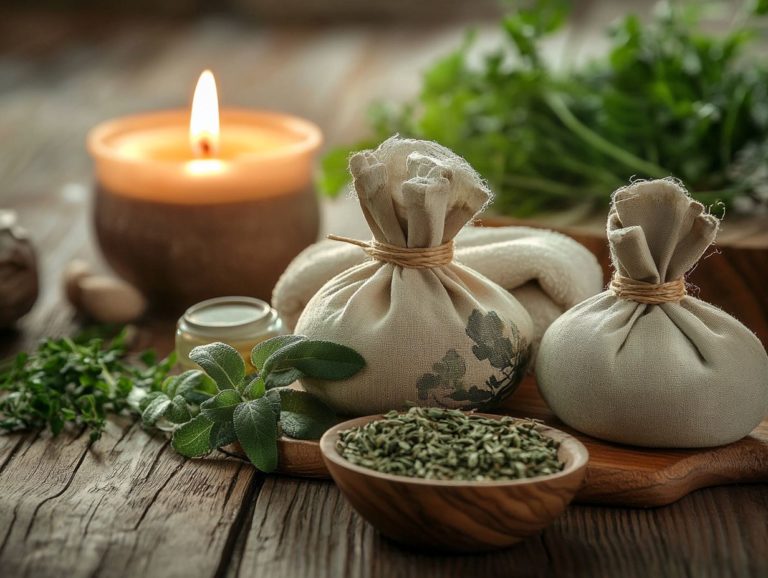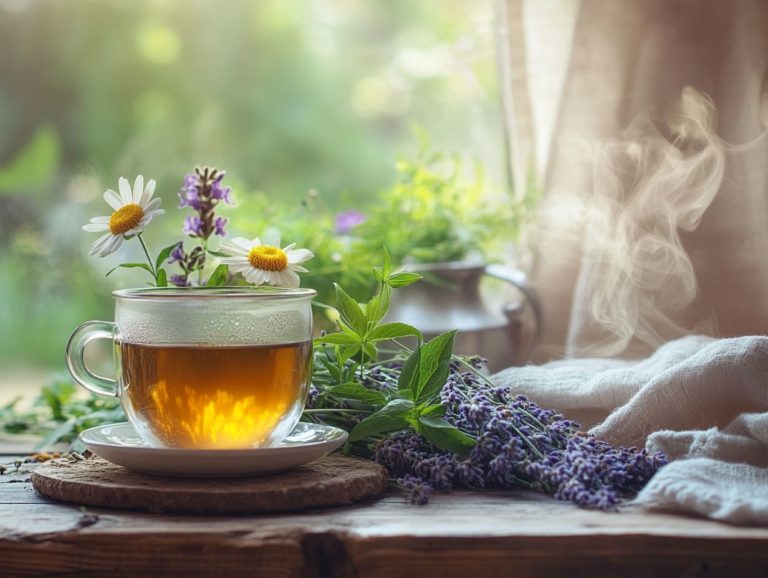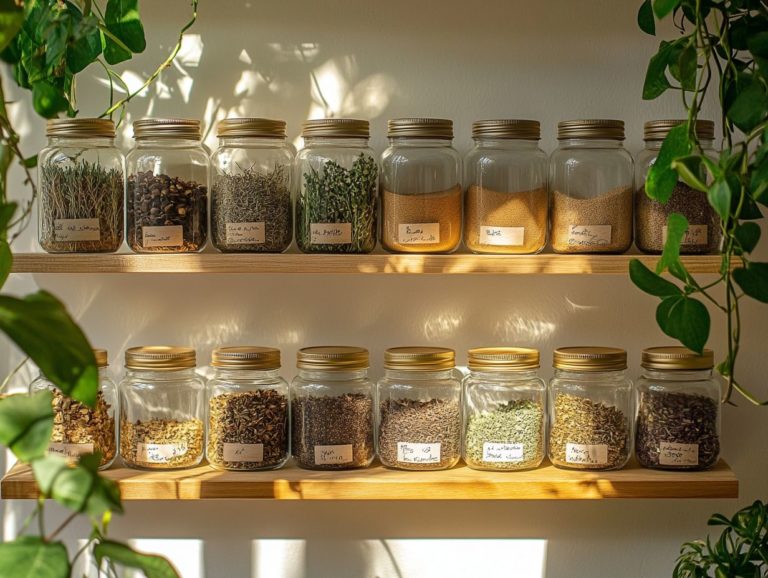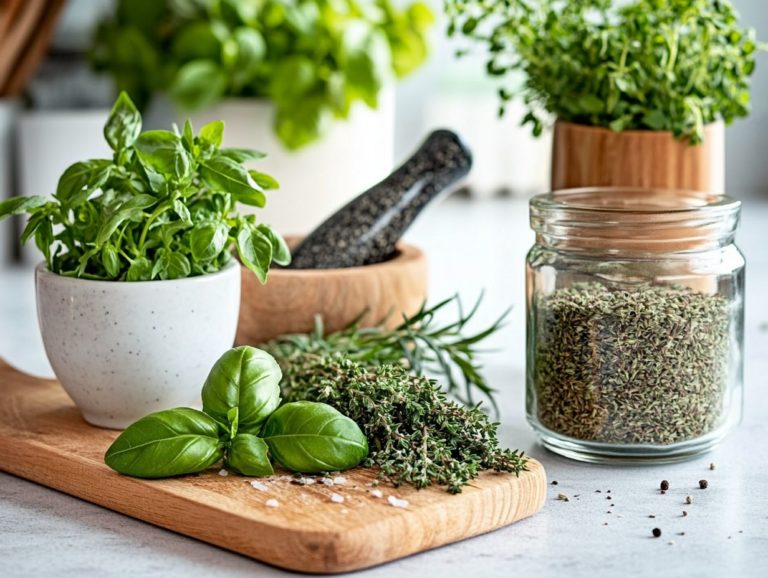Are There Herbal Remedies for Menopause Symptoms?
Menopause is a natural phase in your life, often bringing with it a range of symptoms that can affect you both physically and emotionally. Understanding what menopause entails and recognizing its common symptoms is essential for navigating this transition with grace.
This article delves into effective herbal remedies, popular supplements, and alternative therapies that may help alleviate menopause symptoms. Always consult a healthcare professional before trying something new to ensure your approach is safe and well-informed.
Join in as you discover ways to manage this significant life change with confidence and poise.
Contents
- Key Takeaways:
- Understanding Menopause and Its Symptoms
- Herbal Remedies for Menopause Symptoms
- Other Natural Approaches to Managing Menopause Symptoms
- Consulting with a Healthcare Professional
- Frequently Asked Questions
- What are herbal remedies for menopause symptoms?
- Are herbal remedies safe to use during menopause?
- What are some common herbal remedies for menopause symptoms?
- How do herbal remedies for menopause symptoms work?
- Can herbal remedies completely cure menopause symptoms?
- Are there any potential side effects of using herbal remedies for menopause symptoms?
Key Takeaways:

- Herbal remedies can be effective in managing menopause symptoms, such as hot flashes and mood swings, and are often sought after as natural treatments during menopause.
- Some popular herbal supplements include black cohosh, red clover, evening primrose oil, and ginseng, known for their potential benefits during this significant transition in women s health.
- Always consult a healthcare professional, such as your GP or pharmacist, before trying any herbal remedies or making significant lifestyle changes, especially given the possible side effects associated with some supplements.
Understanding Menopause and Its Symptoms
Menopause represents a pivotal phase in a woman’s life, heralding the conclusion of her reproductive years and introducing a range of symptoms that can influence both health and daily activities. This necessitates an understanding of various treatment options, including herbal remedies and hormone replacement therapy (HRT), which helps replace hormones that your body no longer produces during menopause.
Generally occurring between the ages of 45 and 55, this transition signifies a decline in estrogen and progesterone production. This results in various psychological and physical changes that can unsettle hormonal balance. Recognizing these symptoms, from mood fluctuations to weight gain, is essential for you to navigate this transition with confidence. Many women choose complementary therapies to assist in managing these symptoms.
Talk with your GP or pharmacist about management options, including hormone replacement therapy (HRT) and natural treatments. This can be a proactive step in alleviating these disruptions and enhancing your well-being.
What is Menopause?
Menopause marks a significant turning point in a woman s life, representing the natural biological process that signifies the end of menstrual cycles and reproductive years. It generally occurs between the ages of 45 and 55.
During this transformative phase, you’ll experience noteworthy hormonal shifts, particularly in oestrogen levels. As oestrogen diminishes, you may notice various physiological and psychological changes that influence multiple facets of your health. Symptoms such as hot flashes, mood swings, and sleep disturbances can arise, potentially impacting your overall quality of life. The decline in oestrogen increases your risks for osteoporosis and cardiovascular issues, underscoring the importance of understanding these changes and considering herbal remedies for heart health as part of your management approach.
Embracing a healthier lifestyle during this time can be invaluable. Incorporating regular exercise and a balanced diet into your routine can help mitigate some of these risks and enhance your overall well-being.
Common Symptoms
Common symptoms of menopause can vary widely among women. Many encounter challenges like mood swings, weight gain, and various physical discomforts that can profoundly impact their quality of life. This makes it crucial to explore options such as herbal remedies and dietary supplements.
This transitional phase may also introduce hot flashes, night sweats, and alterations in sleep patterns, resulting in heightened fatigue. You might notice a decline in libido or experience vaginal dryness, complicating intimate relationships. This encourages many to seek both healthcare advice and natural treatments.
Psychologically, anxiety and depression can become more pronounced during this time. This highlights the importance of consulting healthcare professionals or support groups, especially for women considering herbs for relieving PMS symptoms as a complementary therapy.
Understanding these symptoms is crucial; it gives you the power to explore treatment options and lifestyle adjustments. This ultimately enhances your overall well-being during this significant life stage. Don’t wait to take action! Your well-being matters.
Start your journey to feeling better today!
Herbal Remedies for Menopause Symptoms
Herbal remedies are increasingly popular as complementary therapies for managing menopause symptoms. They offer a range of natural alternatives like black cohosh, red clover, evening primrose oil, and soy. Many women explore these options seeking alternatives to hormone replacement therapy (HRT), especially considering the potential side effects associated with traditional medications.
These supplements may help alleviate symptoms such as hot flashes and mood fluctuations. However, it’s essential to evaluate the scientific evidence backing these remedies, including whether herbal remedies can help with insomnia, to ensure safety and efficacy in your treatment approach.
Popular Herbal Supplements

Popular herbal supplements for alleviating menopause symptoms include black cohosh, red clover, evening primrose oil, soy, ginseng, and St. John’s Wort. Each offers unique benefits tailored to support your health during this transitional phase. Many women find these alternatives helpful when considering HRT.
These natural remedies ease hot flashes and mood changes while providing additional health advantages. For instance, black cohosh is known for promoting hormonal balance. Additionally, herbal tea for hormonal balance features red clover, which contains plant-based compounds that can mimic estrogen, enhancing bone health and supporting cardiovascular function.
Evening primrose oil, rich in essential fatty acids, is effective in combating breast tenderness and skin dryness during menopause. Ginseng is favored for its energy-boosting and mood-enhancing effects, while St. John’s Wort may improve emotional well-being and help manage mood swings. Additionally, exploring herbal remedies for anxiety can provide further options for emotional support.
Effectiveness and Safety
The effectiveness and safety of herbal remedies for menopause symptoms often spark discussions due to limited scientific evidence and varying side effects. Always discuss these options with your GP or pharmacist.
Research into plants like black cohosh and red clover suggests they might help alleviate hot flashes and mood swings. However, these benefits can come with risks. To understand more about these natural options, it’s important to explore what herbal remedies are. Herbal supplements may interact with prescription medications or trigger allergic reactions in susceptible individuals.
Consulting with healthcare professionals is crucial if you’re considering these options, especially regarding hormone replacement therapy. This guidance enables you to make informed choices tailored to your health profile, fostering safe practices to manage menopause symptoms effectively.
Other Natural Approaches to Managing Menopause Symptoms
Beyond herbal remedies, there are many natural strategies to manage menopause symptoms. Embrace dietary modifications and lifestyle changes that support hormonal balance and promote overall health, such as consuming phytoestrogens from soy and flaxseed.
By making thoughtful choices, you can navigate this transition with greater ease and vitality. Don t wait; take charge of your menopause symptoms today!
Diet and Lifestyle Changes
Diet and lifestyle changes are essential for managing menopause symptoms, focusing on achieving hormone balance and promoting overall health through thoughtful nutrition and physical activity.
By incorporating foods rich in phytoestrogens, like soy products, flaxseeds, and whole grains, you can support your body’s hormone balance. Prioritizing a diet full of fruits and vegetables ensures you get an ample supply of essential vitamins and antioxidants. These nutrients are crucial for reducing inflammation and combating fatigue, and they can also complement the effects of herbal remedies for PMS symptoms.
Engaging in regular physical activities, such as aerobic exercises and strength training, enhances your physical well-being. These activities help alleviate mood swings and improve sleep quality, which are vital during this transitional phase.
Mindfulness practices like yoga and meditation can significantly reduce stress levels, making your symptom management more effective as you explore various treatments for menopause.
Alternative Therapies
Alternative therapies like acupuncture, yoga, and mindfulness techniques are gaining popularity as effective complementary approaches for women navigating menopause symptoms. These methods aim to enhance your overall health and well-being, particularly alongside the exploration of herbal remedies.
These modalities don’t just tackle physical discomfort, such as pesky hot flashes and night sweats; they also address the emotional challenges that often accompany this life transition, including anxiety and mood swings. Incorporating herbs for reducing menopausal symptoms makes them essential for women seeking holistic solutions.
For many, acupuncture becomes a trusted ally in balancing hormones and improving sleep quality. Yoga fosters flexibility and relaxation, giving you the power to manage stress with greater ease.
Mindfulness practices help cultivate a deeper awareness of your body, nurturing emotional resilience.
Together, these approaches offer a holistic framework for navigating menopause with grace and confidence. This ultimately leads to a more vibrant and fulfilling lifestyle, especially when combined with the right herbal remedies for mood enhancement and dietary supplements.
Consulting with a Healthcare Professional
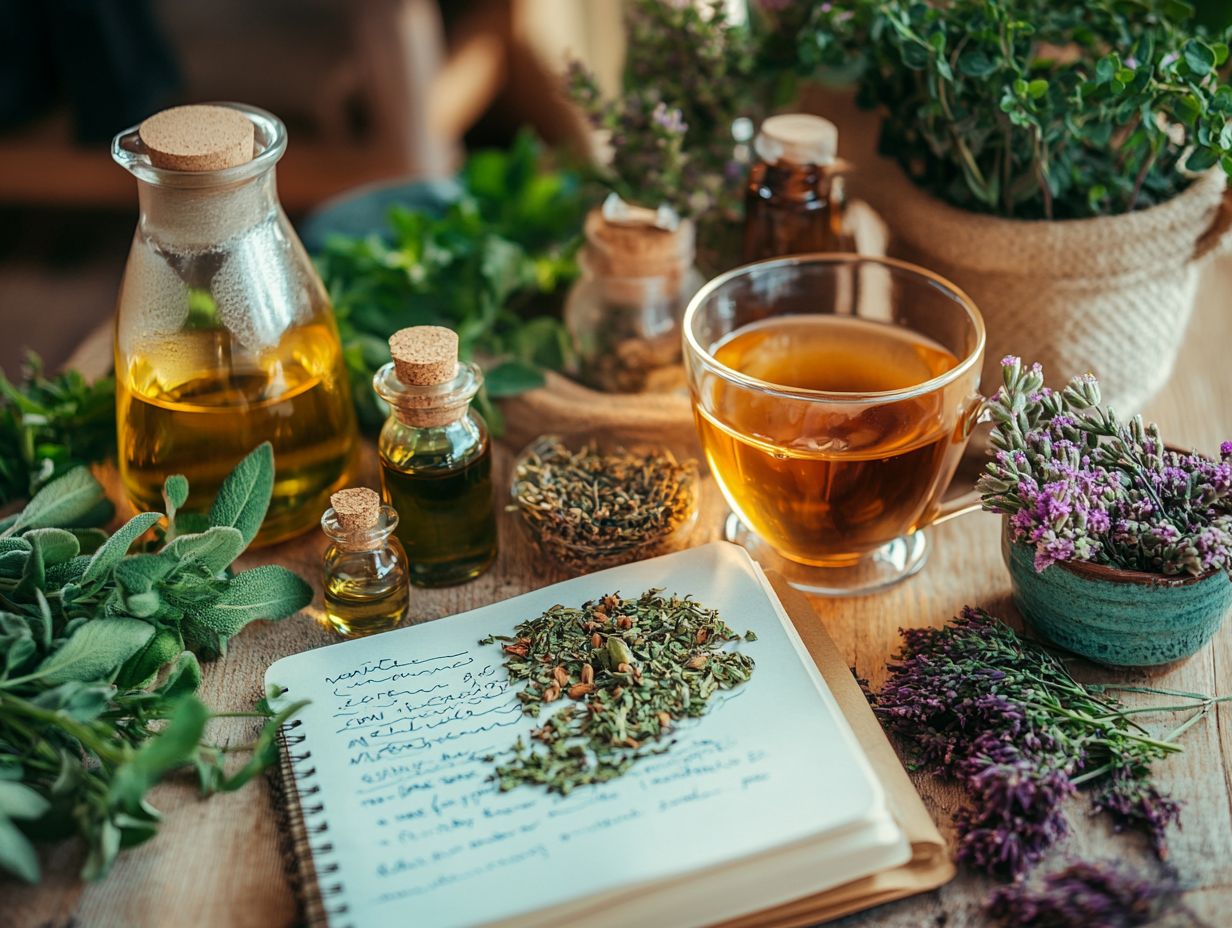
Consulting with a healthcare professional, such as a GP or pharmacist, is crucial for women navigating menopause. These experts can offer tailored medical advice, address any concerns you may have about symptoms, and discuss potential interactions with medications you might be taking.
When to Seek Medical Advice
You should seek medical advice from a healthcare professional or your GP if you’re experiencing severe menopause symptoms that significantly impact your quality of life. This is especially important if you have intense hot flashes, unexplained mood swings, or sudden weight changes.
These symptoms can hinder your daily activities and potentially lead to emotional distress if left unaddressed. When contemplating hormone replacement therapy a treatment to relieve symptoms by balancing hormone levels or natural treatments like black cohosh or red clover, insights from a trusted healthcare provider can clarify the potential risks and benefits, including side effects of herbal remedies.
Regular consultations become a vital resource in navigating the complexities of menopause. This includes dietary adjustments involving soy, dietary supplements, and lifestyle changes that can help alleviate your symptoms.
Don’t hesitate to schedule an appointment today for personalized advice!
Possible Interactions with Medications
Understanding the potential interactions between menopause treatments and other medications is essential. Certain herbal remedies or dietary supplements, such as evening primrose oil and ginseng, could negatively impact the effectiveness of your prescribed drugs.
Open conversations with your healthcare professional about everything you re currently taking are crucial. The risk of complications rises significantly without proper oversight. Your healthcare provider can offer invaluable insights into how various treatments, including HRT and complementary therapy, may interact. This knowledge helps you optimize your management plan so that every option you choose enhances your health.
By regularly reviewing your medications, including any dietary supplements or herbal remedies, you can minimize potential side effects and maximize the benefits of your menopause therapy, ultimately leading to a better quality of life.
Frequently Asked Questions
What are herbal remedies for menopause symptoms?
Herbal remedies for menopause symptoms, including dong quai and valerian, are natural plant-based treatments that alleviate the physical and emotional symptoms associated with menopause.
Are herbal remedies safe to use during menopause?
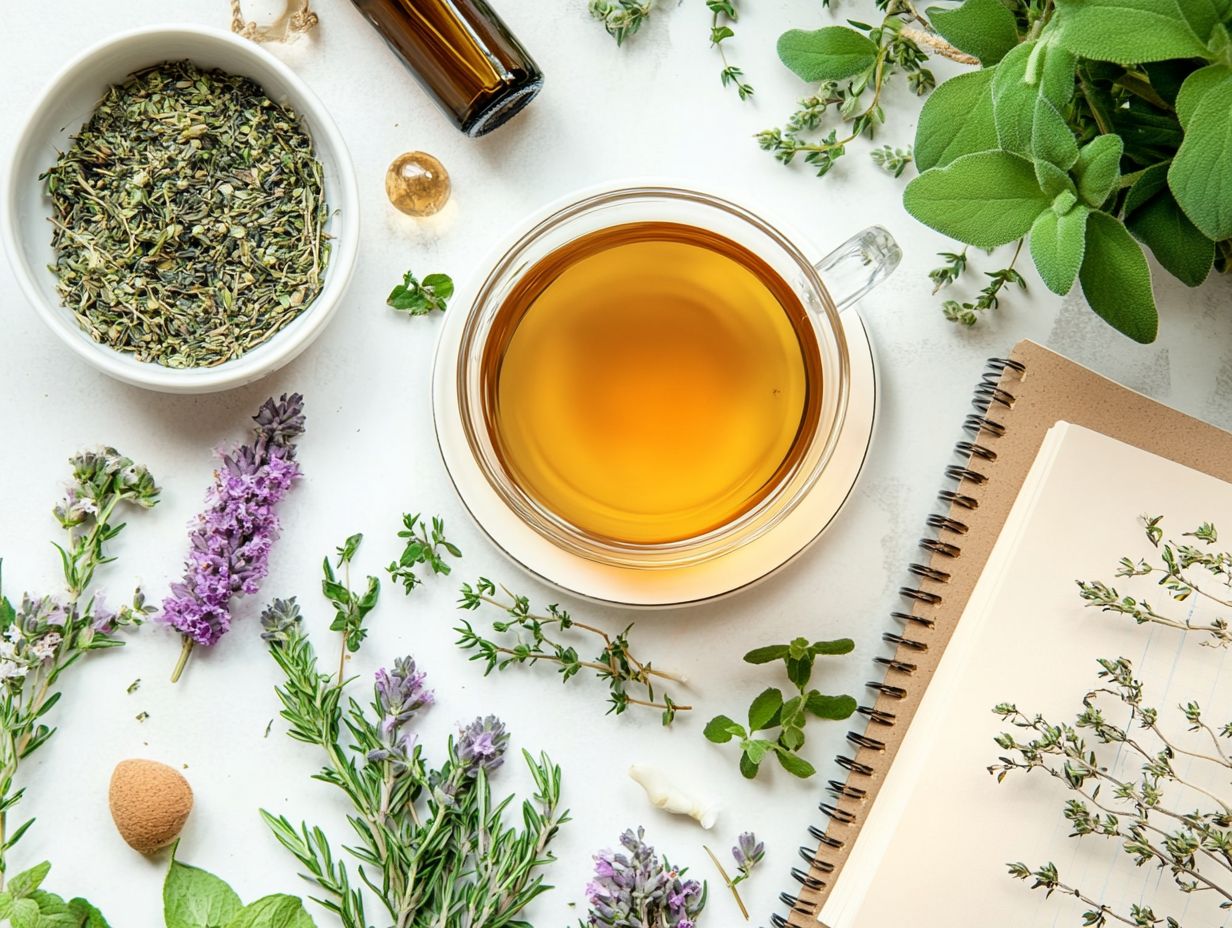
Generally, herbal remedies, such as chasteberry or angelica, are considered safe to use during menopause. However, it’s important to consult with a healthcare professional before starting any new treatment.
What are some common herbal remedies for menopause symptoms?
Some common herbal remedies for menopause symptoms include black cohosh, red clover, evening primrose oil, and soy. These herbs have been trusted for generations to help ease menopause symptoms, like hot flashes and mood swings.
How do herbal remedies for menopause symptoms work?
Herbal remedies contain active compounds, like phytoestrogens, which are plant compounds that mimic estrogen in the body. They can help balance hormone levels and alleviate menopause symptoms.
Can herbal remedies completely cure menopause symptoms?
Herbal remedies can help reduce and manage menopause symptoms, but they cannot completely cure them. Menopause is a natural process, and while herbal remedies like vitamin E or flaxseed can provide relief, they cannot reverse it.
Are there any potential side effects of using herbal remedies for menopause symptoms?
While herbal remedies are generally safe, they can still cause side effects in some individuals. Some potential side effects may include upset stomach, dizziness, and interactions with other medications, especially with treatments like St. John’s Wort. It is important to discuss potential side effects with a healthcare professional.
Consult your healthcare professional today to ensure you’re using the safest and most effective treatments!

